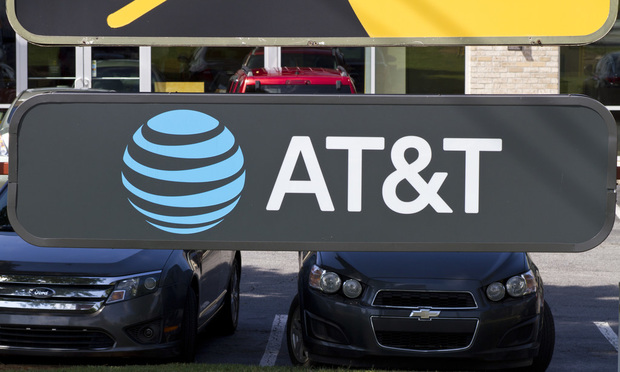Investors Claim AT&T Created Fake Streaming Service Accounts to Hide Failure
According to an amended complaint filed last week in Manhattan federal court, AT&T management overreported the number of customers who had signed up for the company's $35-per-month product, leading investors to believe it was well-positioned to compete with cheaper online streaming services such as Netflix and Hulu.
September 16, 2019 at 03:28 PM
4 minute read
 Photo: John Disney/ALM
Photo: John Disney/ALM
A group of AT&T Corp. investors has alleged in a revised lawsuit that the Dallas-based telecommunications giant and its executives ordered the creation of fake DirecTV Now accounts to mask the failure of the on-demand video streaming service.
According to an amended complaint filed last week in Manhattan federal court, AT&T management overreported the number of customers who had signed up for the company's $35-per-month product, leading investors to believe it was well-positioned to compete with cheaper online streaming services such as Netflix and Hulu.
The filing alleged a "pervasive" and "widespread" pattern at the company, where executives and others among upper echelons of AT&T management encouraged employees to create bogus DirecTV Now accounts for unwitting customers who never signed up for the service. According to the complaint, workers were directed to funnel fees from other services into the allegedly fabricated accounts, which also included fictitious email addresses so customers wouldn't know that they had been enlisted into DirecTV Now.
Meanwhile, AT&T executives, including chairman and CEO Randall Stephenson, trumpeted the service as having "caught fire" with consumers and said the doomed streaming service was experiencing strong growth following AT&T's purchase of DirecTV Group Inc. in 2015.
The new filing came on the heels of a monthslong investigation by lead plaintiffs attorneys from Pomerantz and Labaton Sucharow, which included interviews with former AT&T employees from across the country.
"While AT&T and the executive defendants repeatedly touted the success of DirecTV Now, depicting it as a fast-growing product with strong margins and brisk subscriber growth, in truth, this apparent success was a complete mirage," plaintiffs attorneys from Pomerantz and Labaton Sucharow said in the 233-page filing.
"Information provided by multiple former employees of AT&T and its affiliates from across the country collectively confirm a wide-ranging fraud, perpetrated at the highest levels of the company, as it pertains to subscriber numbers, promotional activity, customer churn, and the growth and success of DirecTV Now," the complaint said.
A spokeswoman for AT&T said the company planned to fight the "baseless" claims in court.
The amended complaint built on an initial filing in April, which alleged violations of the Securities Act of 1933 and the Exchange Act of 1934. The new complaint added named defendants to the suit and offered new theories of scheme liability, lawyers said.
According to the filing, AT&T brass pressured workers to increase sales, leading employees to slip DirecTV Now into customers' subscriptions without their knowledge. In one instance, the complaint said, salespeople were instructed to bundle up to three DirecTV Now accounts with a single mobile phone activation, sometimes creating false email addresses and running a customer's credit cards three separate times.
It wasn't until October 2018, the complaint said, that the company finally reported net subscriber additions for DirecTV were down more than 85% from previous quarters. By January 2019, AT&T acknowledged that "essentially none" of the approximately 500,000 subscribers that were given a steep discount to try DirecTV Now remained with the service, fueling a 4.3% decline in the company's stock price.
"Our complaint alleges that executive management at the very top of the company were aware and approved of the scheme to artificially boost DirecTV Now numbers by whatever means possible. This was a widespread, far-reaching fraud," Labaton Sucharow attorney Carol Villegas said in a statement.
The filing comes as AT&T is facing pressure by activist investor Elliott Management Corp. over its $49 billion takeover of DirecTV in 2015 and its $81 billion deal last year to buy Time Warner. Elliott, which took a $3.2 billion stake in AT&T, said last week in a 23-page letter to the AT&T board that it questioned AT&T's long-term strategy and ability compete for advertising dollars with other deep-pocketed streaming rivals.
Elliott said it would be pushing for additional seats on AT&T's board but stopped short of calling on Stephenson to step down as chief executive.
The lawsuit, filed in U.S. District Court for the Southern District of New York, has been to U.S. District Judge Jesse M. Furman.
The case is captioned Gross v. AT&T.
This content has been archived. It is available through our partners, LexisNexis® and Bloomberg Law.
To view this content, please continue to their sites.
Not a Lexis Subscriber?
Subscribe Now
Not a Bloomberg Law Subscriber?
Subscribe Now
NOT FOR REPRINT
© 2025 ALM Global, LLC, All Rights Reserved. Request academic re-use from www.copyright.com. All other uses, submit a request to [email protected]. For more information visit Asset & Logo Licensing.
You Might Like
View All
Bankruptcy Judge Clears Path for Recovery in High-Profile Crypto Failure
3 minute read

Silk Road Founder Ross Ulbricht Has New York Sentence Pardoned by Trump
3 minute read
Walt Disney, IBM Denied High Court Review of Old NY Franchise Tax Law
3 minute readTrending Stories
- 1Gunderson Dettmer Opens Atlanta Office With 3 Partners From Morris Manning
- 2Decision of the Day: Court Holds Accident with Post Driver Was 'Bizarre Occurrence,' Dismisses Action Brought Under Labor Law §240
- 3Judge Recommends Disbarment for Attorney Who Plotted to Hack Judge's Email, Phone
- 4Two Wilkinson Stekloff Associates Among Victims of DC Plane Crash
- 5Two More Victims Alleged in New Sean Combs Sex Trafficking Indictment
Who Got The Work
J. Brugh Lower of Gibbons has entered an appearance for industrial equipment supplier Devco Corporation in a pending trademark infringement lawsuit. The suit, accusing the defendant of selling knock-off Graco products, was filed Dec. 18 in New Jersey District Court by Rivkin Radler on behalf of Graco Inc. and Graco Minnesota. The case, assigned to U.S. District Judge Zahid N. Quraishi, is 3:24-cv-11294, Graco Inc. et al v. Devco Corporation.
Who Got The Work
Rebecca Maller-Stein and Kent A. Yalowitz of Arnold & Porter Kaye Scholer have entered their appearances for Hanaco Venture Capital and its executives, Lior Prosor and David Frankel, in a pending securities lawsuit. The action, filed on Dec. 24 in New York Southern District Court by Zell, Aron & Co. on behalf of Goldeneye Advisors, accuses the defendants of negligently and fraudulently managing the plaintiff's $1 million investment. The case, assigned to U.S. District Judge Vernon S. Broderick, is 1:24-cv-09918, Goldeneye Advisors, LLC v. Hanaco Venture Capital, Ltd. et al.
Who Got The Work
Attorneys from A&O Shearman has stepped in as defense counsel for Toronto-Dominion Bank and other defendants in a pending securities class action. The suit, filed Dec. 11 in New York Southern District Court by Bleichmar Fonti & Auld, accuses the defendants of concealing the bank's 'pervasive' deficiencies in regards to its compliance with the Bank Secrecy Act and the quality of its anti-money laundering controls. The case, assigned to U.S. District Judge Arun Subramanian, is 1:24-cv-09445, Gonzalez v. The Toronto-Dominion Bank et al.
Who Got The Work
Crown Castle International, a Pennsylvania company providing shared communications infrastructure, has turned to Luke D. Wolf of Gordon Rees Scully Mansukhani to fend off a pending breach-of-contract lawsuit. The court action, filed Nov. 25 in Michigan Eastern District Court by Hooper Hathaway PC on behalf of The Town Residences LLC, accuses Crown Castle of failing to transfer approximately $30,000 in utility payments from T-Mobile in breach of a roof-top lease and assignment agreement. The case, assigned to U.S. District Judge Susan K. Declercq, is 2:24-cv-13131, The Town Residences LLC v. T-Mobile US, Inc. et al.
Who Got The Work
Wilfred P. Coronato and Daniel M. Schwartz of McCarter & English have stepped in as defense counsel to Electrolux Home Products Inc. in a pending product liability lawsuit. The court action, filed Nov. 26 in New York Eastern District Court by Poulos Lopiccolo PC and Nagel Rice LLP on behalf of David Stern, alleges that the defendant's refrigerators’ drawers and shelving repeatedly break and fall apart within months after purchase. The case, assigned to U.S. District Judge Joan M. Azrack, is 2:24-cv-08204, Stern v. Electrolux Home Products, Inc.
Featured Firms
Law Offices of Gary Martin Hays & Associates, P.C.
(470) 294-1674
Law Offices of Mark E. Salomone
(857) 444-6468
Smith & Hassler
(713) 739-1250






